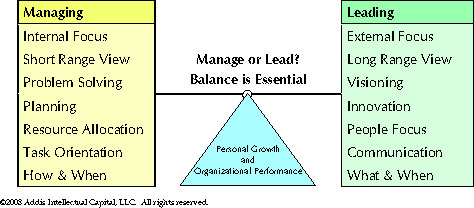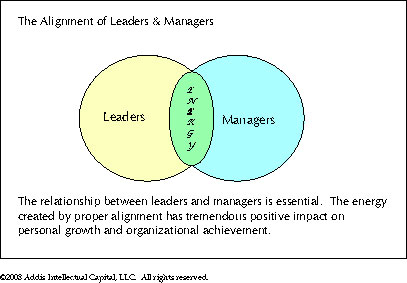|
Beyond Insurance
Leading vs. managing
Understanding the difference is key to your success
By Scott Addis
Are you a manager or a leader? Although these terms are used interchangeably, they represent very different people with very different personalities and worldviews. By learning whether you have the characteristics of a manager or a leader, you will gain the insight and self-confidence that come from knowing more about yourself. This knowledge will have a profound impact on your personal growth and the success of your organization.
Managing is about stewardship, control, planning, organizing, resource allocation and problem solving. It is the act of coordinating people and resources to efficiently produce goods, strategies or services. Leading is the process of influencing others to achieve mutually agreed upon goals for the good of the organization. It is about vision, people alignment, culture and communication supported by the firm’s mission and guiding principles. (See chart below.)
Let’s take a look at the two senior partners of Discovery Point Insurance & Risk Management Services, a fictitious property/casualty agency. Oscar serves as the chief executive officer and Felix is the president and chief operating officer. Oscar is a leader. Felix is a manager. Their diverse skill sets offer a perfect complement for Discovery Point. The organization enjoys unparalleled organic growth and profitability, in large part due to the teamwork of Oscar and Felix.
The manager (Felix)
Felix is an outstanding manager. He came to Discovery Point approximately 15 years ago to oversee the firm’s property/casualty operations, budgeting, reporting, human resources, stewardship and quality assurance practices. Felix works closely with his staff in setting performance standards, meeting deadlines and benchmarking operational efficiency and profitability.
His gift is one of organizational metrics—a necessary and critical function for his insurance agency. Felix often asks the question, “What operational issues need attention and what are the best means to achieve results so that my staff can best meet our client demands?” Felix is a problem solver. He is focused on goals, resources and organizational structure. He is persistent, tough minded, hard working, intelligent, analytical, tolerant and demonstrates good will toward others.
The leader (Oscar)
Oscar started at Discovery Point as a producer 20 years ago. He transitioned into the CEO position approximately four years ago. Oscar thinks and acts quite differently from Felix. He is not focused on the bottom line. Rather, Oscar is keenly aware of the impact of his people on the bottom line. He understands that behaviors create success. Oscar has a gift of empowering people to take ownership for their roles, responsibilities and actions. Oscar knows how to get his staff to respond. He is an amazing motivator and developer of talent.
While Oscar is externally focused, Felix is internally focused. Oscar does not get bogged down in the details of internal process, rather, sees his role as creating value through design and development of innovative systems, technologies and strategies. It is Oscar’s creativity and vision that excites the staff.

The importance of balance
Great organizations have a wonderful balance between leaders and managers. Leaders are the visionaries who look ahead and plan what is to come. Managers look to the present and make sure that things get done properly. To build and grow an organization, you need leaders. And to manage one, you need managers. It is interesting to note that most leaders are not good managers. It serves leaders well to be aware of their limitations and not over-stretch themselves in that role. It is easier to turn a great manager into a leader than the other way around.
The success of Discovery Point shows the importance of balance. Both Oscar and Felix understand one another’s unique abilities and play off of one another. (See the chart at right.)
Oscar and Felix are proud to be partners and embrace one another’s skills. Oscar appreciates Felix’s management capabilities. Felix applauds Oscar’s visionary talents. Behind the desks of Oscar and Felix, there is a document titled Discovery Point “Balanced Score Card.” Oscar and Felix developed this tool after reading On Becoming a Leader by Warren Bennis. The “score card” states:
• The manager administers; the leader innovates
• The manager maintains; the leader develops
• The manager focuses on systems and structures; the leader focuses on people
• The manager has a short-range view; the leader has a long-range perspective
• The manager asks how and when; the leader asks what and why
• The manager has his/her eye on the bottom line; the leader has his/her eye on the horizon
Felix has a thoughtful, consistent way of making sure that each person is accountable. Oscar is the value creator—always looking to tweak the vision of the organization. Put simply, Felix is “running a tight ship,” while Oscar “inspires the crew.”
On those rare occasions when Oscar and Felix step on each other’s turf, the firm is paralyzed. However, the paralysis is short-lived because the staff of Discovery Point helps Oscar and Felix focus on their unique skill sets. Staff members understand and appreciate both individuals’ strengths and weaknesses.
They value the ability of Felix to put order and stability into the corporate culture, yet they understand that he is not gifted at instigating change and vision for the future. On the other hand, the staff embraces Oscar’s unique ability to stir emotions, raise expectations, explore the unknown and take the firm into unchartered waters.

The leadership message
The ability to manage the affairs of an organization is paramount. However, it is becoming increasingly rare to find an inspiring and gifted leader who possesses the following five abilities:
1. Ability to create a shared vision for the organization. The “vision” must be clear, compelling and properly articulated. The staff must buy into the leader’s vision and have passion for it.
2. Ability to build the right team. Because leaders do not have the time and ability to execute the vision, it is essential that the right team be put into place. They must also be armed with tools to implement the vision.
3. Ability for the leader to get out of the way. The leader’s vision creates energy, enthusiasm and passion. On occasion, however, the vision gets diluted because the leader gets in the way of those who execute. A gifted leader knows when to get out of the way to let his or her team design, build and execute.
4. Ability to value people. Great leaders understand their gifts and recognize their limitations. They understand the importance of recognizing the accomplishments and talents of those who support their vision. The ability to value others is an essential ingredient of the successful leader.
5. Ability to ride the wave of chaos. People don’t like change. They feel comfortable with the status quo. The leader’s challenge is to establish a culture that embraces innovation—where the staff’s energy and excitement about the future vision overshadow nervousness and anxiety.
Are you a manager or a leader? Your ability to understand the difference will have a profound impact upon your career and those who support you. *
The author
Scott Addis is the president and CEO of The Addis Group and Addis Intellectual Capital, LLC (AIC). AIC is a coaching and consulting company whose purpose is to transform the process that insurance agents, brokers, and carriers use when working with their clients. Scott is a recognized industry leader who has been awarded the Inc Magazine “Entrepreneur of the Year” award and named one of the “25 Most Innovative Agents in America” by the National Alliance for Insurance Education and Research. To learn more about the content of this article, you may contact Scott at saddis@beyondinsurance.com; (610) 945-1019 or www.beyondinsurance.com.
|